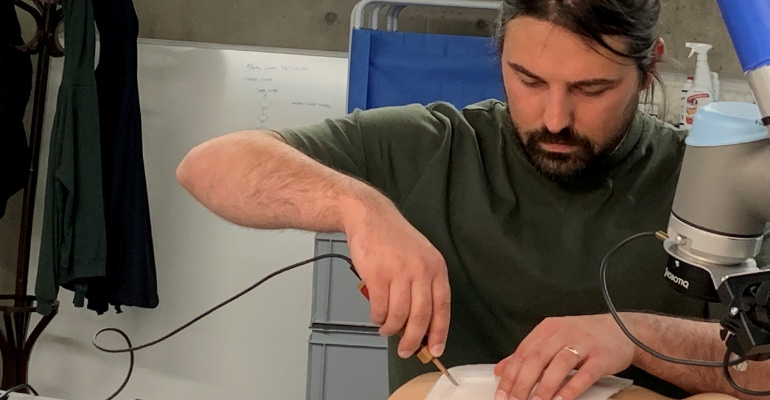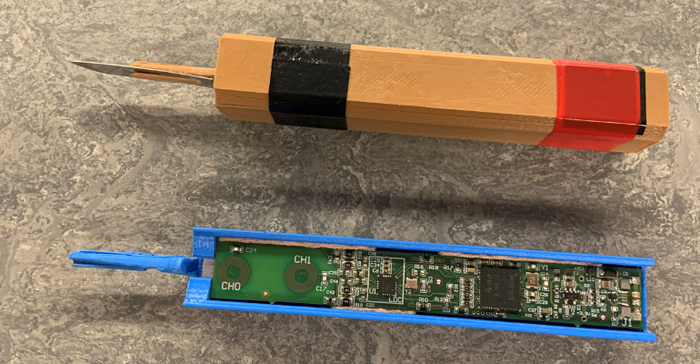Study Suggests Smart Scalpel Assists in Surgical Skill Assessment
Investigators say their smart scalpel could assess the force users are applying during surgical procedures and quantify how they control the device over time.

The level of force applied when using a scalpel is known to be an important skill for clinicians. Usually, clinicians must assess the needed level of force by naked eye, using years of experience to understand what is needed for each procedure. But what if there was a way to track the scalpel force used in procedures?
Recently, investigators from the University of Edinburgh published a study in Communications Engineering suggesting that their smart scalpel could assess how much force users were applying during surgical procedures and quantify how they controlled the device over time.
“Despite the central role that forces play in surgery, the analysis of these remains a novel area of research, as the majority of developed methods for analyzing these skills are vision-based and mainly focus on instrument motion,” according to the study. “However, there is some evidence that force-based performance metrics can be superior to metrics that are based on movement alone. In addition, recent studies indicate that tool-tissue interaction forces can uniquely reflect a surgeon’s competence. Interestingly, studies show lack of correlation between tool-tissue forces and motion parameters. Moreover, unlike motion parameters force parameters show no correlation with the execution time of surgical tasks.”
The investigators developed a low-cost device which consists of a scalpel connected to a senser-loaded circuit board fitted inside the handle. It uses a machine learning model that analyses data captured as force is applied by scalpel users.

To test the technology, they tracked 12 medical students and two surgeons — a consultant neurosurgeon and a plastic surgeon — as they carried out an elliptical incision. An elliptical incision involves making two curved cuts to the skin and is used to remove moles and skin legions like melanoma. Throughout the incision, a scalpel users non-dominant hand applies continuous tension to the skin surrounding the area of concern, while the dominant hand controls the scalpel’s movement. Usually, the procedures’ success relies on the expertise of the clinician.
“Successful tissue dissection implies the application of appropriate force levels — sufficient for deliberate and controlled tissue separation, but not too excessive to avoid iatrogenic tissue damage,” investigators wrote. “In addition, cutting forces are continuously modulated by active tissue tensioning and the scalpel’s nonholonomic-like movement through viscoelastic tissues.”
The procedure was performed on synthetic material that mimics the properties of human skin.
The incisions done with the smart scalpel were compared with naked eye assessments made by four surgeons — two neuroscientists and two plastic surgeons — who concluded that the results broadly matched their assessment of each user’s ability, suggesting the technology could help simplify the process when assessing surgical skills, according to the investigators.
“These components can compactly describe the execution of elliptical excisions,” the study authors wrote. “Our generative model offers greater insight into analysis of skill when compared to descriptive statistics, and the model can quantify the subjective evaluation of excision skills and enable the comparison of expert assessors with differing implicit assessment criteria.”
Of note, in the data assessment of the smart scalpel procedures versus naked eye, there were some discrepancies based on the surgical experts differing instruments and tissue handling techniques.
“The discrepancies in subjective assessment of the overall proficiency perceived by the experts highlight the challenges in teaching and assessing skills that are typically mastered through apprenticeship,” investigators wrote. “These differences in assessment might reflect the different specialities, schools, or experience levels of the experts. In this study, we treat each expert assessment as an equally valid evaluation.”
Future development of the smart scalpel, according to the University of Edinburgh, could help users hone their skill with the use of quantifiable data. Additionally, the device could aid in the creation of robotic devices that perform procedures safely and efficiently as the scalpel pressure used by a robotic assistant could be tracked for ideal pressure.
“We are excited to develop this new system, which uses a combination of real-life sensing technology and machine learning methods to quantitatively assess surgical skill,” said Ram Ramamoorthy, professor at the University of Edinburgh’s School of Informatics, in the schools press release. “This system will enable the development of new systems for skill assessment and training and could one day lead to the creation of automated surgical devices that can assist surgical teams.”
About the Author(s)
You May Also Like



.png?width=300&auto=webp&quality=80&disable=upscale)
